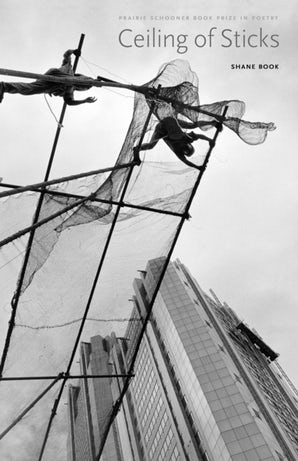Ceiling of Sticks
by Shane Book
reviewed by Ben Purkert
Shane Book, winner of the Prairie Schooner Book Prize in Poetry and a former Wallace Stegner Fellow at Stanford University, lays the context for his current project in a poem called “Santa Cruz,” in which he notes the laughable state of media coverage in America: “Back on the street, the newspaper box—you / couldn’t dream this: a war on and the front page with a picture of a bikini- / clad chimp.” Ceiling of Sticks presents itself as an alternate outlet—a swift portal into the deeper concerns of geographies and peoples, present and past, who are underreported in both their beauty and suffering.
Book was born in Peru, the son of a white Canadian father and a black Trinidadian mother, and this tradition of multiculturalism informs the settings of his poems, as he whisks his reader across Ontario, Mali, Uganda, and Ghana. A documentary film editor as well as poet, he writes with cinematic precision, never more evident than in “Stop.” Set on a wooded road beside a just-ambushed truck, the speaker is told to stay put and not look, as “blood / continues down the shut door, / staining the earth dark.” Still, he cannot help keeping an eye open, albeit held to a squint, musing, “I’m a pinhole camera.” Book’s most arresting images emerge during such moments of duress; his eye is sharpest when ordered not to flinch.
The politics of Ceiling of Sticks recall the work of Carolyn Forché, though its poetics are perhaps more suggestive of Philip Levine, whom Book mentions in his acknowledgements. One hears Levine’s influence quite clearly in the poem “Photograph of Religious Sacrifice, Tarahumara, Mexico, 1984,” which takes as its focus a boy and his offering of a goat: “Their eyes are open but not watching, / exactly, boy and goat poised, as if to say to some god / looming in the lens, Is this what you want.” Like Levine, Book celebrates humanity by exposing life’s grit—our daily painstaking labors on behalf of the self, others, even a higher being. With echoes of Levine’s oft-anthologized “You Can Have It,” this poem from Book voices frustration with a god at telescope’s distance, too removed from the sensitivities of the subjects Book seeks to document up close.
As a work of reportage and poetry, Ceiling of Sticks earns high marks for its credibility. This is not a comment on its factual accuracy, but rather Book’s highly-developed understanding of the unwritten cause-and-effect operations within communities, particularly those of his own family. In one breathtaking gesture, Book distills the complex relation of race and privilege in “San Fernando, Trinidad, 1954” when he writes of a woman, “her skin a good / cinnamon; therefore her indoor sink.” Similarly in “My People,” Book effectively clarifies the place of food vis-à-vis cultural celebration, for if “there is no rice so there is / dancing no longer.”
While many of the collection’s most affecting discoveries are situated within the personal history explorations of our speaker, there are lines here too where the language falls short. In “Dust,” for example, which Book has since adapted for film, the poet toggles between two bathroom scenes, one involving a lover, the other an ailing grandparent. Though associative in its conceit, the leaps within the scenes feel small and the rhythm prose-like. In contrast to the surrounding poems, “Dust” feels like a narrative better suited to a different medium.
Book closes out his debut with a crescendo, however. “To a Curl of Water” uses anaphora to effect a cinematographic experience that reveals what’s most at stake for the poet:
I still believe in small Ontario towns. I believe
in aging maples, the Sub-Saharan night sky, spitting
snakes, dirty beaches. I believe in tractor-trailers,
the endless fact of a wave’s story, the green sea mold
growing in slave castle walls. I believe
a girl and her family cannot disappear.
Here, Book’s skill as a technician is on display: the quick cuts, the zoom-in specificity of place and mood. But more than just a final reprisal of the poet’s talents, these lines hint at a critical anxiety that motivates Ceiling of Sticks and, perhaps, all documentary work: the knowledge that truths fade in the absence of someone to record them. By authoring these poems, Book ensures that certain characters and communities will not vanish from memory.
Ceiling of Sticks is an impressive, far-reaching first collection from an artist with many stories to share. Book crosses boundaries with both urgency and ease, transporting his reader from the arena of the personal to more remote worlds of significance. This is the real achievement and the most interesting aspect of these poems: how Book takes disparate landscapes and brings them under one roof.
Published on March 18, 2013

